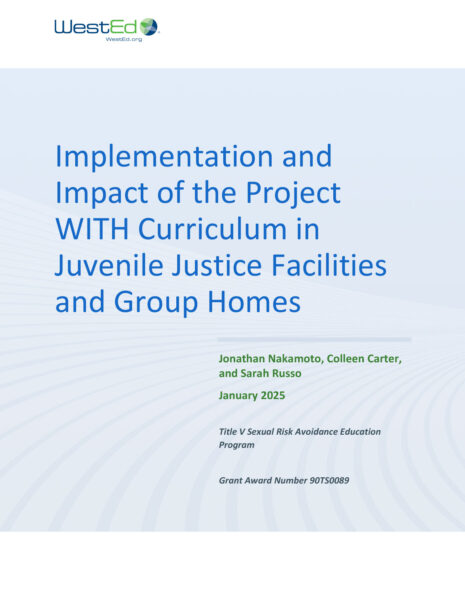
April 21, 2025
What works when it comes to supporting our most vulnerable youths? For policymakers, educators, and other professionals, answering this question requires evidence. Rigorous research methods are essential to evaluating programs and interventions that aim to improve justice system outcomes.
Supporting data-driven decision-making across the justice and education systems, WestEd offers tools and research to evaluate interventions and address disparities, particularly for vulnerable populations like justice-involved youths and students in foster care.
Here’s how rigorous research is guiding meaningful interventions in these areas:
Using Regression Discontinuity Design for Justice-Related Evaluations
Regression Discontinuity Design (RDD) is a powerful tool for evaluating interventions in the justice system. This collection of resources from WestEd’s Justice & Prevention Research Center introduces the RDD method and demonstrates its relevance to crime reduction and justice system reform.
The collection includes three briefs that
- explain the RDD method and its practical use for evaluating justice interventions,
- review over 60 RDD studies relevant to the crime and justice fields, and
- provide six key recommendations to encourage the broader application of RDD in justice-related evaluations.
The collection also features summaries of three studies that applied the method effectively, as well as blogs and additional materials to support wider learning and implementation.
Read more about how Regression Discontinuity Design is advancing justice system research.
Supporting Youths in Juvenile Justice Settings
Justice-involved youths often experience major disparities in sexual health, driven by systemic inequities and limited access to comprehensive education. Project With is a curriculum created to address these challenges by helping youths strengthen relationship skills and improve self-management.
Implemented in juvenile justice facilities and group homes, the curriculum was evaluated by WestEd to understand its reach and perceived impact. Findings show that Project With addresses key gaps in knowledge and behavior for participating youths, supporting their growth in critical areas that influence long-term outcomes.
Read more about the evaluation and implementation of Project With.
New Research Highlights Educational Gains and Gaps for California Foster Youths
Students in foster care represent one of the most underserved student populations in California. A new report revisits the findings of a landmark 2013 study and assesses how these students have fared since the introduction of the Local Control Funding Formula.
The updated analysis reveals that, despite improvements in some areas like school stability and graduation rates, students in foster care continue to struggle with chronic absenteeism, suspensions, and college readiness—challenges that were further exacerbated by the COVID-19 pandemic.
This follow-up report aims to inform educators, policymakers, and child welfare professionals by emphasizing the importance of distinguishing foster youths from broader high-need categories in education planning, ensuring that their unique needs are addressed directly.
Research and Evaluation at WestEd
WestEd builds your knowledge and informs your teaching, leadership, and organizational practices.
As a leading national research organization, we provide you with research and evaluation studies that meet the highest levels of rigor and protect the confidentiality of data.
Our studies build evidence and produce insights to inform practices that support positive outcomes. We use interdisciplinary methods and take a collaborative approach that reflects the needs of our clients and the communities they serve.
Learn more about our approach and see examples of our impact.








